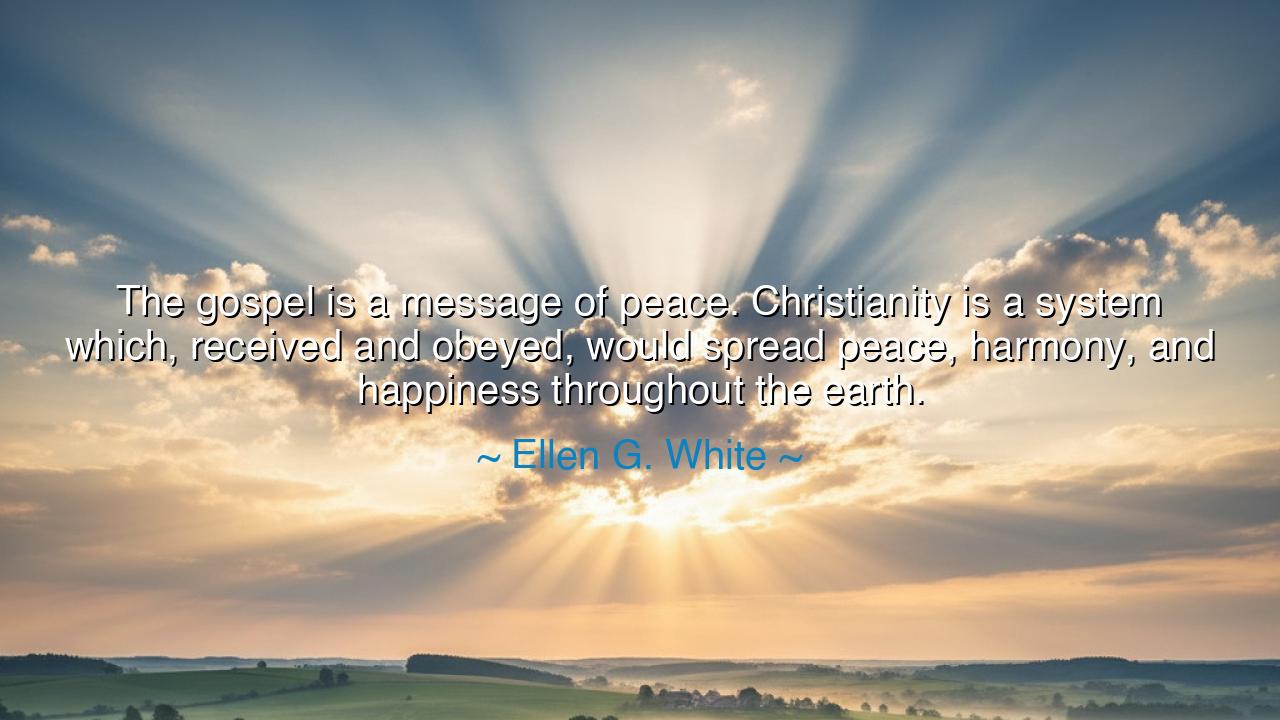
The gospel is a message of peace. Christianity is a system which
The gospel is a message of peace. Christianity is a system which, received and obeyed, would spread peace, harmony, and happiness throughout the earth.






The words of Ellen G. White—“The gospel is a message of peace. Christianity is a system which, received and obeyed, would spread peace, harmony, and happiness throughout the earth”—speak like a hymn rising through the centuries. In these lines, the voice of a prophetess reaches beyond doctrine to the beating heart of faith itself. The gospel, she reminds us, is not merely a collection of beliefs or commands; it is a living message, a divine current meant to bring peace to the restless human soul and, through it, to the whole world. It is not only to be believed—it is to be lived. And when truly lived, it transforms discord into harmony, selfishness into compassion, and despair into joy.
To understand this wisdom, we must look to the life and time of the one who spoke it. Ellen G. White, a guiding voice of the 19th century and a co-founder of the Seventh-day Adventist movement, lived in an age of great turmoil—an era marked by wars, industrial greed, and spiritual confusion. Yet in the midst of such unrest, she envisioned a higher order of life, one governed not by ambition or domination, but by the spirit of Christ, whose kingdom was not of this world. When she spoke of Christianity as a “system,” she meant not a mere religion of rituals, but a divine way of life—a moral and spiritual framework through which humanity could reflect heaven’s peace upon earth.
The ancients, too, understood this truth: that peace does not descend from power, but from righteousness. The Hebrew prophets cried that justice and mercy must walk together; that peace, like a river, flows from hearts reconciled to God and to one another. In the same spirit, White teaches that the gospel’s promise of peace is not passive—it is an active harmony, born of obedience to divine principles. For she knew that the message of Christ is not one of escape from the world, but of transformation within it. The Christian who truly follows the Master’s example becomes a living channel of reconciliation, a vessel of light in a darkened age.
Consider the example of Francis of Assisi, who, centuries before Ellen White, heard the same call. Born into wealth and war, he turned away from comfort to embrace poverty, love, and peace. His simple greeting—“Peace and good will”—was not empty courtesy but the embodiment of the gospel itself. Through his obedience, the world around him began to change. Enemies reconciled, the poor were uplifted, and even the beasts of the field seemed to respond to his gentleness. In his life, we see the living proof of White’s vision: that when the gospel is received and obeyed, it becomes a force capable of healing nations and softening hearts.
And yet, how easily mankind forgets this. Through the ages, Christianity, meant to be a balm, has sometimes been wielded as a weapon; the message of peace distorted by pride and power. White’s words therefore stand not only as a description, but as a rebuke and a challenge—a call to return to the essence of the gospel, which is love in action. She warns that belief without obedience is like a lamp without oil—it may glitter for a moment, but it cannot light the way. True peace, she teaches, requires the surrender of self—the yielding of our own will to the higher will of God, so that His spirit may breathe through us as peace to others.
In the ancient philosophies, too, this truth was mirrored. The Stoics sought inner calm through virtue; the Buddhists taught serenity through compassion and detachment. But White’s teaching carries a unique flame: peace is not earned—it is received, and once received, it must be shared. The Christian who lives by the gospel becomes a bearer of divine harmony, a reflection of heaven’s order amid the world’s chaos. For to follow Christ is to bring the kingdom of peace not only into one’s own heart, but into the streets, the homes, and the nations of humankind.
So, dear listener, let this be the lesson drawn from her words: if you would find peace, do not seek it in wealth or conquest, nor even in solitude—but in obedience to love. Speak gently where others shout. Forgive where others wound. Build bridges where others raise walls. For this is the true gospel—not mere belief, but the living practice of compassion. When the system of Christianity is received in this way, peace ceases to be a dream and becomes a way of life.
Thus, the wisdom of Ellen G. White endures as a torch to every generation. The gospel she described is not a distant hope, but a living path before our feet. Follow it, and you will find not only personal peace, but the power to spread harmony and happiness to all the earth. For when even one heart lives by this truth, the world itself grows quieter, kinder, and closer to the paradise it was always meant to be.






AAdministratorAdministrator
Welcome, honored guests. Please leave a comment, we will respond soon